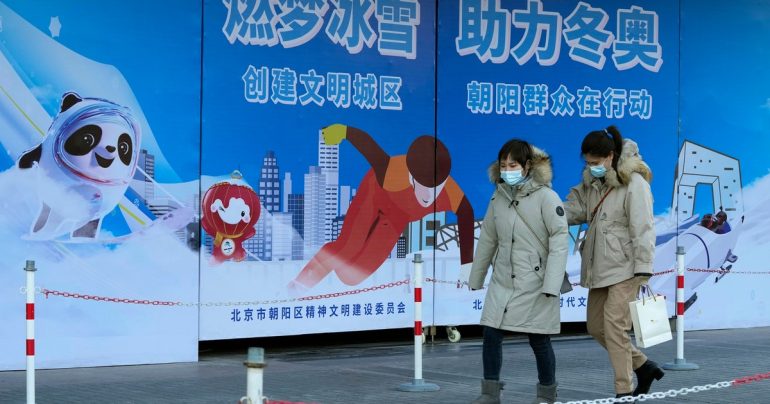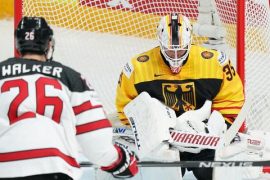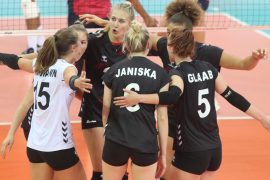Berlin – Boris Johnson used the connection between sport and politics for his own purposes in 2012 – In his own way: After that, dressed in a shirt and suit in a blue hardhat, the Union Jack in his hand, he races down through a cable car There was a park next to the Olympic venue. Suddenly the drive stopped and Johnson was swinging in the air. The spectacle was at its peak, but the British found such mishaps so endearing at the time that they eventually chose the messy-haired, omnipresent man who was hardly the prime minister for every photo and camera during the Olympic Games in London. .
Sports and politics are a combination that is booming in the Olympic Games. Because there is hardly any other place where images can be better staged and publicity can be conveyed to the people in a better way. However, there will be no photos of Chinese leaders accompanying Johnson at the Winter Games, which are due to open in Beijing in February 2022. Great Britain, Australia and Canada are not sending government officials to the Winter Olympics in China. Prime Minister Johnson, Australian Prime Minister Scott Morrison and Prime Minister Justin Trudeau made the announcement on Wednesday.
FDP MEP Beer calls for complete boycott
The countries are thus joining the US diplomatic boycott, as New Zealand did earlier. However, athletes from these countries are free to participate. “There will actually be a diplomatic boycott of the Beijing Winter Olympics,” Johnson told parliament’s weekly Question Hour. However, boycotting the game is “not a policy” of his government.
However, Nicola Beer, FDP Member of the European Parliament and Deputy Speaker of the European Parliament, urged the move. The European Union must “not only stay in the slipperiness of the United States, but stand on its hind legs for the observance of human rights and speak in favor of a complete boycott of the Winter Games”, Beer told Funke Media’s newspapers. . Group. He called the Games in China “the wrong platform in the wrong place”. Chancellor Olaf Scholz has yet to position himself for the major sporting event in China.
According to Dagmar Freitag, former chairman of the sports committee in the Bundestag, a diplomatic boycott is aimed not only at China’s political leadership, but “to the same extent” in the IOC, which had awarded the Games to Beijing and currently because tennis players Peng Shuai has been criticized for his behavior in the case of disappearances. The SPD politician believes this will send a signal. “If IOC President Bach will soon be sitting in the VIP stand with the autocratic dictators of this world,” Freitag said, “it will also be a pointer to the sponsors of the IOC premium product, the Olympic Games.”
Thomas Weikert, the new president of the German Olympic Sports Confederation, has so far spoken out against the boycott of the Games. And as much as the organization “Athleton Deutschland” supports the concerns of tennis player Peng Shuai and criticizes the IOC for placing a human rights criterion behind political, but above all economic interests, it denies a sports boycott of the Games. . “From an athlete’s point of view, a sports boycott is categorically ruled out,” said Maximilian Klein from “Athleiten Deutschland”. Athletes were put in an impossible position. “They have been preparing these games for years for their personal and sporting climax, and now they must be responsible for something they have nothing for.”
Olympic luge champion Geisenberger doesn’t rule out boycott
Critical voices from German winter sports enthusiasts about events in China and giant, newly built sporting facilities such as the Toboggan Run in Yanqing have risen recently. For example, double Olympic champion Natalie Geisenberger said she does not rule out boycotting the Winter Games in Beijing in 2022 because of the circumstances just before the World Cup. Toboggan’s colleague Felix Loch argues: “As athletes, we can only raise our hands, in general a lot needs to change. If Natalie or the entire German Toboggan team says she doesn’t ride there, Even then the Olympics will take place, ”said the Olympic champion from Vancouver and Sochi. “It is the right decision to clarify this on a political and sporting level.”
This means that winter athletes in 2022 will find themselves in the same dilemma as summer athletes in 2008, when Beijing was the last Olympic city. At the time, fencer Imke Duplitzer expressed criticism of China’s handling of human rights with a boycott of the opening ceremony, which he described as a humanitarian and material fight.

Web guru. Amateur thinker. Unapologetic problem solver. Zombie expert. Hipster-friendly travel geek. Social mediaholic.





